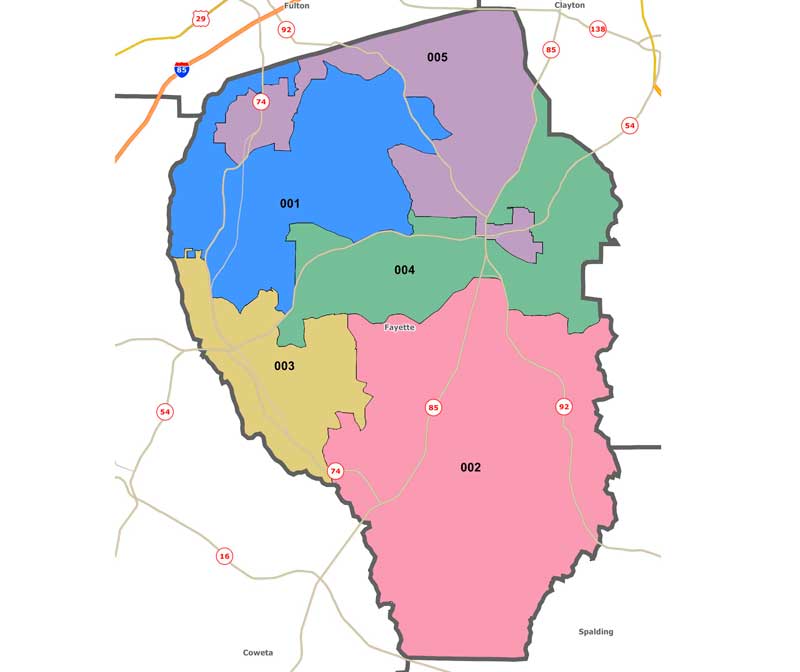Commission to challenge new 50.22% district that runs from Tyrone across N. Fayette down into F’ville
The Fayette County Commission is “pursuing an appeal” of a federal judge’s ruling that mandates an overhaul of how members are elected to the county commission and board of education.
Part of that overhaul is a remapping of the county’s voting districts.
The May 21 ruling from U.S. District Judge Timothy C. Batten calls for implementation of a district voting scheme to replace the current at-large method of electing members to the county commission and the board of education. The pre-trial ruling came as the result of a lawsuit filed by the local and national branches of the National Association for the Advancement of Colored People along with several Fayette residents.
While the commissioners were tight-lipped about their decision following Thursday’s closed-session meeting, The Citizen has received a copy of the district map proffered by the NAACP. The majority-minority district created by that map stretches from a small part of Fayetteville, encompassing a big chunk of north Fayette County and then a majority of the town of Tyrone.
To include Tyrone, however, the map used a very narrow strip of land to connect the unincorporated north Fayette County. The county has asserted that the NAACP map creates a district that is not sufficiently geographically compact.
The proposed new minority voting district resembles a wide horseshoe with a hook on one side.
The NAACP argues that since 20.1 percent of Fayette County residents are black according to the 2010 Census, that allows them relief under Section 2 of the federal Voting Rights Act so they may create a majority-minority precinct that would guarantee a black person would be the elected candidate. When the Census results are limited to those of voting age, the number dips down to 19.5 percent.
Another key number in this lawsuit is 35, which is the estimated margin of black voters over the 50 percent mark — 50.22 percent, to be exact — in the new majority-minority district proposed by the NAACP.
While that margin may be thin in a district of more than 20,000 people, the fact that the district creates even a slim majority of minority voters is sufficient, Batten said.
The NAACP contends, and the judge agreed, that at-large voting in Fayette County has made it impossible for black residents in the county to “elect a candidate of their choice.”
The current at-large voting process allows all voters to cast ballots on all five seats on the board of education and county commission. District voting, however, would limit voters to selecting only one member to each governing body, based on the geographical district they live in.
Favoring the NAACP, Batten ruled that “under the totality of the circumstances, [African-Americans in Fayette County are] denied meaningful access to the political process on account of race or color.”
Batten’s order also quotes a court case that says if the majority-minority district sought as relief is not “reasonably compact” the Voting Rights Act does not require it to be enacted.
Batten ordered all parties to submit “proposed remedial plans” for the next election cycle by June 25, but an appeal is expected to put a halt to that process.
Judge Batten’s ruling came about in a summary judgment order, which circumvented a potential trial on the matter. In an evidentiary hearing in May 2012, neither of the “experts” who drew maps on behalf of the county or the NAACP testified under oath about how they undertook that process.
The district map prepared by the NAACP may face a challenge because it includes two commission incumbents in the same district: David Barlow and Allen McCarty.
The board of education, named as the other defendant in the lawsuit, is slated to discuss next week whether or not it will join the appeal of the judge’s decision. It is possible that the county’s appeal would halt the adoption of district voting for the school board, as they are listed as co-defendants in the case. Previously, the judge reversed his previous approval of a district voting map hammered out by the NAACP and BoE based on the fact that he had been unaware the county commission had not also approved the map.
The commission has taken some heat from citizens over the spending to defend the lawsuit brought by the NAACP. As of last week, the county had spent more than $283,000 on the matter. The NAACP, which has criticized such spending, has not publicly revealed how much it has spent on the lawsuit even though Fayette taxpayers may be on the hook for those funds as well depending on how the final ruling shakes out.
If the county follows through on the appeal, it will be brought to the 11th Circuit U.S. Court of Appeals and if it passes muster, it would almost certainly be considered by a small panel of judges instead of the entire court.
The full map of proposed redrawn voting districts is below.












Leave a Comment
You must be logged in to post a comment.